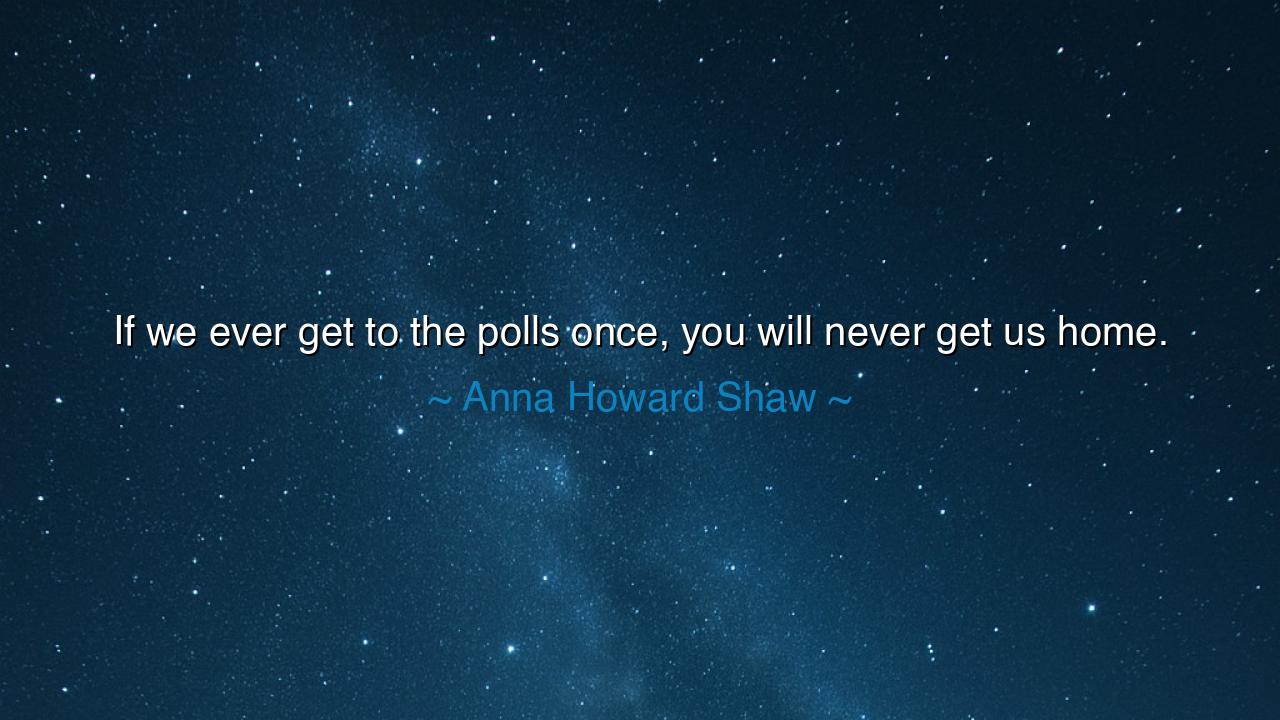
If we ever get to the polls once, you will never get us home.






In the immortal and fiery words of Anna Howard Shaw, a voice of conviction and courage in the age of struggle, we find this declaration that resounds like a battle cry through the corridors of time: “If we ever get to the polls once, you will never get us home.” These words, forged in the furnace of the women’s suffrage movement, are not merely political—they are spiritual. They speak of awakening, of the irreversible moment when a people, long silenced, rise to claim their rightful place among the free. Beneath the simplicity of the statement lies an ancient truth: once the human spirit tastes liberty, it can never again be content with servitude.
Anna Howard Shaw, a minister, physician, and one of the fiercest champions of women’s rights in America, spoke these words during a time when women were still denied the sacred right to vote. She had seen with her own eyes how laws written without women’s voices bound them like chains, denying them agency over their own destinies. Yet she also knew something profound—that suppression cannot endure forever, for the heart of humanity yearns for equality as surely as the seed yearns for sunlight. When she proclaimed that “once we reach the polls, you will never get us home,” she was foretelling the unstoppable tide of empowerment. She spoke not in hope alone, but in prophecy: that once women claimed the right to participate, the old world would crumble, and a new one would rise in its place.
Her words carry the rhythm of revolution, but also of revelation. The “polls” were not merely a place of voting—they were the gates of transformation, the threshold between silence and voice. To “get to the polls once” meant more than casting a ballot; it meant stepping into visibility, into legitimacy, into history. And to “never get us home” was to declare that the old domestic boundaries—the walls meant to confine women to hearth and shadow—would no longer hold. Shaw’s vision was not only political but cosmic: a turning of the wheel of destiny, where half of humanity, long relegated to the margins, would finally stand at the center of creation’s work.
This truth has echoed across ages. Every revolution of the human spirit begins with such a moment—when those who have been silenced awaken to their power. In ancient Greece, Antigone, defying the king to bury her brother, claimed a moral authority higher than law. In the fields of France, Joan of Arc lifted her voice and sword in defiance of all who told her to return home. In the streets of Selma, Martin Luther King Jr. and his followers walked across the bridge not simply for votes, but for dignity. In every age, the pattern is the same: once the oppressed step forward, they do not step back. As Shaw understood, liberation is irreversible—for freedom, once ignited, becomes a flame that burns forever in the heart of humankind.
The origin of this quote lies in that great epoch when the women of America and the world stood upon the edge of transformation—the early 1900s, when the struggle for suffrage reached its peak. Shaw, alongside leaders like Susan B. Anthony and Elizabeth Cady Stanton, carried the torch of perseverance through ridicule, imprisonment, and violence. The men who opposed them believed that politics was no place for women, that they should remain “at home.” But Shaw’s words struck like thunder: once women entered the public sphere, they would never return to silence, never again surrender the power of their voices. Her statement was both warning and promise—warning to the oppressors that the age of domination was ending, and promise to the oppressed that their march would not be in vain.
In her statement, we also glimpse the eternal law of progress and awakening. Every generation must cross its own threshold of enlightenment, must choose between the comfort of the known and the courage of the new. Those who fear change wish to keep others “at home”—safe, contained, dependent. But as Shaw reminds us, once the door of truth is opened, there is no closing it again. Once the mind has glimpsed justice, it cannot be satisfied with half-measures. This is the sacred rhythm of history: the march forward, step by step, poll by poll, until all who live under heaven stand as equals before it.
The lesson of Anna Howard Shaw’s words is as alive today as it was a century ago: the awakening of one conscience awakens many. When you step forward for your rights, for your truth, you do not walk alone—you carry generations with you. In your courage lies the courage of those who came before, and the hope of those yet to come. The practical teaching is this: do not wait for permission to stand where you belong. Do not retreat when the world tells you to return “home.” For every step taken in the direction of justice creates a path for countless others.
So remember, O listener, the fierce wisdom of Anna Howard Shaw: that freedom, once touched, is eternal. Let her words echo in your heart as both anthem and oath: “If we ever get to the polls once, you will never get us home.” When you raise your voice, when you claim your right to be seen, you become part of the unending march of humanity toward light. For liberty is not a gift bestowed by power—it is the birthright of every soul, and once it is known, it can never, ever be forgotten.






AAdministratorAdministrator
Welcome, honored guests. Please leave a comment, we will respond soon